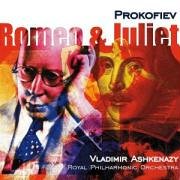| All Artists: Sergey Prokofiev, Vladimir Ashkenazy, Royal Philharmonic Orchestra Title: Prokofiev: Romeo & Juliet Members Wishing: 0 Total Copies: 0 Label: Decca Import Release Date: 5/13/2003 Album Type: Import Genre: Classical Styles: Ballets & Dances, Ballets, Historical Periods, Modern, 20th, & 21st Century Number of Discs: 2 SwapaCD Credits: 2 UPC: 028943607827 |
Search - Sergey Prokofiev, Vladimir Ashkenazy, Royal Philharmonic Orchestra :: Prokofiev: Romeo & Juliet
 | Sergey Prokofiev, Vladimir Ashkenazy, Royal Philharmonic Orchestra Prokofiev: Romeo & Juliet Genre: Classical
|
Larger Image |
CD Details |
CD ReviewsA new first choice account of Prokofiev's enchanting ballet cwb | Carmel, IN | 05/11/2005 (5 out of 5 stars) "What a fantastic DIGITAL recording of Prokofiev's masterpiece! This is probably my favorite ballet, and so I have collected (too) many recordings trying to find the perfect one. Previn's London Symphony and Maazel's Cleveland Orchestra recordings are both admirable, but Ashkenazy's account with the Royal Philharmonic rises to the top of my list. Ashkenazy succeeds in bringing out Prokofiev's jaunty rhythms and captures the deep passion and romance that these young "star-crossed" lovers experienced for one another. The tempos seem appropriate throughout. Ashkenazy's tempo changes in the "Love Dance" caught me a bit off guard at first, but after listening a few times they made sense (I can't remember what the score calls for there). This account, more than any other that I've heard, summons the image of dancers on stage. (For a more symphonic approach, look to Previn's recording.) The Royal Philharmonic is simply superb. My biggest complaint with most other recordings of this ballet (including Previn's) is that the violins are so often out-of-tune. The intonation here, however, is simply impeccable. The strings play warmly and with precision (see, especially, "Romeo Decides to Avenge Mercutio"), and the first violins are simply amazing in the "Balcony Scene." The woodwind solos are beautifully played throughout (the flute solos are much clearer and better supported than those in Maazel's recording, and the oboe solos are darker and warmer than those in both Maazel's and Previn's orchestras). The brass section is fantastic in all three recordings, but balance notably well here. The digital recording gives Ashkenazy an advantage over Maazel and Previn. The sound is crystal clear, which allows one to appreciate Prokofiev's unique orchestration techniques, such as his use of soaring violin harmonics and haunting low-register piccolo. The transparency of sound also allows one to hear details such as interesting woodwind doubling and middle horn parts much more clearly. Overall, I would recommend this recording above all others. There are very few moments that aren't flawless, the orchestra is virtuosic, the sound is fantastic, and the full spectrum of emotions that this story evokes is exploited to the fullest. Of course owning other recordings, especially Maazel's and Previn's, is essential for the truly committed fan of this work, but if you plan to have only one recording, this should be your one." Go figure! Good Stuff | 11/29/2004 (5 out of 5 stars) "I will never understand the logic that would lead a recording company to spend a vast amount of money on a recording project, and one that turns out to be outstandingly successful, only to let the end result languish unreleased for a dozen years. What do they think it is, a rare Cabernet Sauvignon? Hint to the recording companies: If it's good, which this certainly is, it won't get better by letting it age in the vault. It ain't wine. That said, this is simply a marvelous recording. Obviously, it is not alone in the catalog. But it does move to the top. I'm old enough to remember regretting it when Ashkenazy began moving into conducting, purely for the selfish reason that I didn't want him to spare a single moment away from the keyboard for other disciplines. I was wrong." A Fine Account, Splendid Sound F. Adcock | Silsbee, Texas United States | 04/14/2004 (5 out of 5 stars) "At last, a digital recording of "Romeo and Juliet" to stand alongside the great analog accounts by Andre Previn and Lorin Maazel. I would have no problem recommending this new one by Vladimir Ashkenazy, for the sound is absolutely state-of-the-art, with fine detail within a pleasing hall ambience.Although I rate this with 5 stars, it is not the last word, as far as I am concerned, for both Previn and Maazel speak volumns on their respective recordings. Ashkenazy is actually closer to Previn in choice of speeds, even using slower tempi in some dances when compared to Previn. Maazel wins the speed race, and his sound brings to mind microphones on each music stand. With Ashkenazy, the brass, especially the trombones and horns, seem to move in and out within the orchestral structure, and I would love to have heard more gutsy trombone entries in some of the duelling music. Previn is my choice in the passionate romantic music, for Ashkenazy's interpretations in this area are a little too square for my taste, although he delivers an exquisite Epilogue. The street music has never sounded so vivacious. The Royal Philharmonic is a bit better than their two competitors in the discipline department, though not by much.All three of these recordings do justice to the dramatic moments in the score, and each, in its own way, should be in most collections. There is absolutely no reason to pass on this fine recording, especally if digital sound is a must."
|

 Track Listings (27) - Disc #1
Track Listings (27) - Disc #1